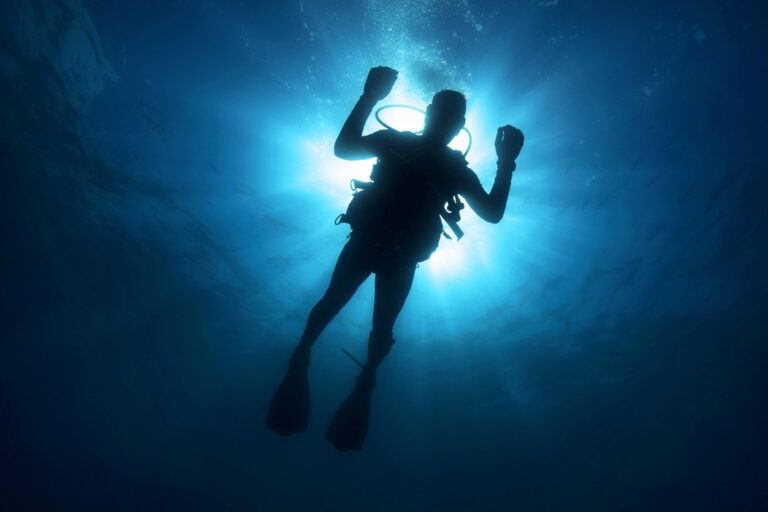Scuba-diving participation in the USA, the world’s biggest diving market, had almost recovered to pre-Covid levels in 2022 – but statisticians have noted a shift among those doing the diving.
The number of people who went diving last year was similar to that in 2019 before the pandemic, the key difference being that those involved were increasingly “casual” as opposed to “core” divers, whose participation continued to drop sharply.
The data comes from the 2023 Sports & Industry Association’s Topline Participation Report, as interpreted by the Business of Diving Institute (BODI), which focuses on market research and publishes Scubanomics to share dive-industry analysis. Casual divers are defined as those doing fewer than eight dives a year, core divers as those doing more.
Some 2.7 million Americans, less than 1% of the US population, scuba dived at least once in 2022, representing a 7.3% increase on the previous year. Breaking down this figure, casual divers’ participation rate rose by 12.1%, while that of core divers sank by -5.1%.
Vacation activity
The pandemic appears to have accelerated a pre-existing trend. “Scuba diving is increasingly a casual activity done during a vacation that includes many other activities,” says BODI founder Darcy Kieran.
“Baby boomers were ‘all in’ and went to dive-resorts offering nothing but scuba diving, but the younger generations are not that committed. Scuba diving is just one thing they do in-between other activities.” This trend, he says, was adversely affecting diving-equipment sales, especially less travel-friendly items such as BCs and regulators.
However, Kieran insists that younger divers should not be blamed for the decline in “committed” diving, and says that the dive industry’s business model had been designed for the now-dwindling generation of “baby-boomers” (divers aged 58-77 in 2022) and had failed to adapt sufficiently to market developments.
While boomers still made up 8.8% of the market in 2022, the biggest sector was millennials (23-42-year-olds) at 18.8%, closely followed by Generation Z (aged up to 22) at 17.4% and Generation X (aged 43-57), who accounted for 13.4%.
Overall, scuba diving remained one of the fastest-growing water sports activities in 2022, level with boardsailing/windsurfing and beaten only by jet-skiing – a trend that will bring little joy to divers. About 7.4 million Americans went snorkelling at least once during the year, unchanged from 2021.
Coming this weekend: The Go Diving Show


I am 71 learned to dive in 1991. In New Jersey Deep , Dark & cold but over 2000 ship wreck in my back yard, some weeks one dive other weeks 6 dives Addicted to diving , Next diving the world . Cocoa island Costa Rica, island of the sharks. Truk logon 40 Japanese ww11 ship wreck dive your wreck heart out . Every island in the Caribbean. Dove from State of Maine to Key west . Quarry, Lakes & Rivers , Reservoir, My wife does not dive so we take separate vacation . Wife said I have gills , sold off my Dry suit & cold water gear move to Florida , if the weather good , ocean forecast looks drivable. I am under the blue waters of the ocean. I dive so much I am up to my 3 rd scuba tank compressor. And yes I dive solo.
Would be interesting to know what figures are like for different geographic regions.
In our region (GCC) there was a large increase in new divers during COVID (we were undertaking the annual number of open water dives in a month). Although some of these remained casual there has been a significant increase in the number of core divers who have continued to dive. We have a strong diving community that is focused on the diving experience.
I think this ties nicely in to Darcy’s comments about a paradigm shift in the dive industry. In this location (and the other places abroad where I routinely dive) there is a strong sense of community. Whilst training is a key component to get new divers safely in to the sport, retention can’t be guaranteed on courses alone I see the creation of a diver centric community was a key component in the retention of divers within our country.
That being said would Darcy’s proposed model work across all geographic regions and destinations? I have seen a success story in a wealthy tourist destination. Whereby unlike many local shops by regular dive center thrived during COVID due to the high numbers of core divers across the island moving over to them. But suspect it may not work as well in other destinations with a high temporary/tourist population, especially in poorer regions.
Either way a rigid business model is not ideal. It needs to be adapted to suit the changing customer requirements and expectations at the local level.
As someone who’s been diving since 1978. A MSDT who has travelled extensively, I am rather shocked with the disgusting course, equipment and boat dive prices. No wonder the industry is crashing. I and many others no longer instruct. I would love to be in the position to provide base rate training, creating divers for life. That’s the core value the industry has lost, by being greedy and not considering the long term picture. Time to get off my box🤣